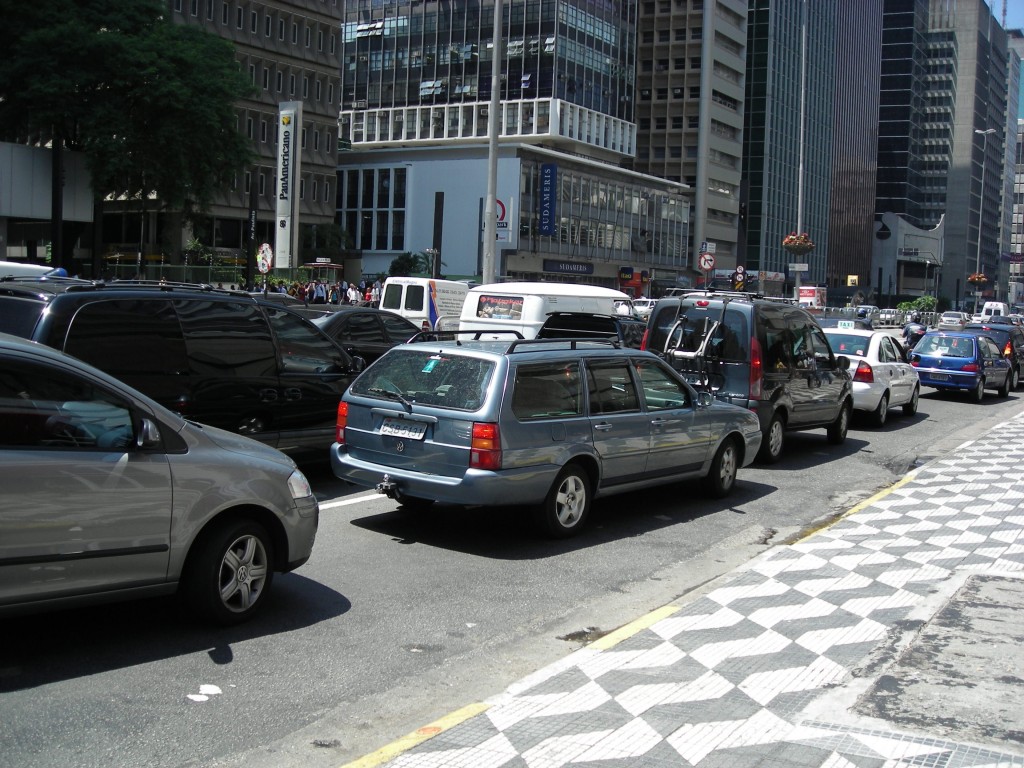
Traffic in São Paulo. Photo © Kate Webster, licensed Creative Commons Attribution No-Derivatives.
Driving in Brazil is not for the faint of heart. Brazilians have a love affair with speeding and are hardly sticklers for following the rules of the road. As the economy has improved in recent years, more and more people have purchased cars, which means traffic in major cities is increasingly congested, and not just in Rio and São Paulo, whose traffic jams are nightmarish. In the Northeast and the North in particular, the state of the roads can be dismal once you get out of the major cities, although main coastal highways are kept in good shape. Until recently, drunk driving was a major problem. However, in July 2008, Brazil’s lamentable record for having one of the highest vehicle accident death tolls caused the government to enact the law of Zero Tolerance. This has resulted in police-organized blitzes around the country. Drivers are stopped arbitrarily and must take a Breathalyzer test. If even the slightest amount of alcohol is detected, you’re looking at a R$955 fine and a suspension from driving for one year. In reality, however, these “blitzes” are only a partial deterrent; it’s best to be on your guard when driving back from a long day at the beach (where it’s a Brazilian tradition to knock back more than a few). If you want to visit natural attractions around big cities, a car gives you much more freedom to hit off-the-beaten-track destinations where buses don’t go (if they do, it’s likely they’ll make 200 local stops or the one daily departure is at 5am).There are instances when a car is a definite plus in Brazil. If you want to visit natural attractions around big cities, a car gives you much more freedom to hit off-the-beaten-track destinations where buses don’t go (if they do, it’s likely they’ll make 200 local stops or the one daily departure is at 5am). Also, for beach or waterfall hopping, cars can come in very handy since you can hit secluded coves and cascades not accessible by bus. Avoid traveling on big holiday weekends when traffic is guaranteed to be atrocious. Also avoid driving at night. Outside of major cities, roads are poorly lit and speed bumps and potholes are common. Another problem is the number of cargo trucks on highways, especially unpaved and two-lane routes. It’s not uncommon for drivers on long hauls to be sleep deprived or amped up on amphetamines. In more isolated regions, there is also the risk of highway robbery.If you have kids, a car is close to essential for reasons ranging from comfort and practicality to safety, not to mention the ease with which you can go on family outings and holidays. With or without children, cars also come in handy at night when public transportation options dwindle and security is more of an issue. That said, even night driving in major cities has its risks. It’s best to stick to main streets and be careful of veering off into unknown neighborhoods. Also be careful when stopping at traffic lights to keep windows rolled up. Some cities, such as São Paulo, have even passed legislation for drivers to merely slow down at red lights, but they are not obliged to stop—on account of the risk of holdups and carjackings.
Coupled with the challenges of driving are the challenges of parking. Aside from shopping centers and other main commercial and recreational venues, parking lots are rare in Brazilian cities. The upshot is driving around and looking for a spot in the street. Whether or not you need help finding a space (and navigating your car into it), you’ll usually have the assistance of an informal parking attendant known as a flanelinha. Aside from helping you back in and out, he’ll promise to watch over your car as well. Regardless of whether he does or not, it’s customary to “tip” him a couple of reais (this could be more depending on the city or neighborhood) since he makes his living this way. Many flanelinhas aggressively make you feel payment is obligatory and will demand a certain price; if very high or if you’re only stopping for a short time, feel free to point this out. However, know that if you don’t give something (upon your return; don’t pay up front), you risk finding a scratch, or worse, on your car. Despite the fact that attendants also claim they’ll “watch over” your car to prevent theft, never leave any valuables in your vehicle, even in the trunk.
Excerpted from the First Edition of Moon Living Abroad in Brazil.